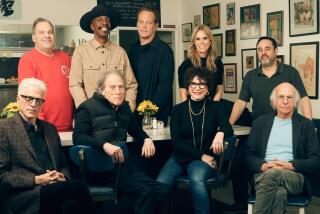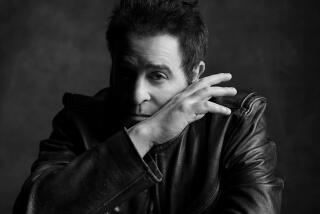TV’S UNCLE CHARLES PADS THROUGH PAST
- Share via
For all we know, the real Charles Kuralt wears designer underwear, drives fast cars and drinks martinis for breakfast. Perhaps he dines only in French restaurants, favors spats and doesn’t know a tater from a crater, a hoedown from a meltdown, a fiddle from a riddle or a corncob from a corndog. Is it possible?
Nahhhhhh!
Not America’s uncle. Not this roly-poly Populist who, whether speaking from Jacksonville, Vt., or Cedarville at the head of Deep Creek in Modoc County, Calif., gives corn a good name.
The pictures and sound don’t lie. You can hear the admiration in his world-class voice as he describes Tom Scribner of Santa Cruz as the nation’s “best musical saw player.”
Kuralt plays TV like a musical saw--flexing, stroking and producing the kind of quivering tones that fill you with sentiment and emotion and pride in your own good taste and judgment for watching him in the first place.
Although he has hosted “CBS Sunday Morning” since its inception in 1979, his signature has always been those “On the Road” essays that appear all too infrequently on “The CBS Evening News.”
For two decades now, we’ve enjoyed travels with Charlie.
Hence tonight’s “20 Years on the Road With Charles Kuralt” (at 8 p.m. on Channels 2 and 8), a collection of his favorite pieces, ranging from the amazing Chandlers of rural Mississippi to the people of North Platte, Neb., who welcomed troops during World War II.
It’s a rich, fulfilling hour, typically Kuraltian in its total command of words and pictures.
When you recall Dan Rather venturing into America’s heartland a couple of years ago, wearing a plaid shirt and resting his foot on a block of hay while reporting on the problems of farmers, you appreciate Kuralt all the more. He has never pretended to be anything but the city boy he is, an outsider from urban America paying a call on rural America.
Most of his pieces are set in tiny hamlets where people really do mark distance as “down the road a piece.” While the evening news deals with the Persian Gulf, Bernhard Goetz and turbulence in South Korea, Kuralt toasts smallness over bigness.
Tonight he flashes back to Shelton, Neb., and newspaper editor Doug Duncan, whose definition of a small town is: “You know you’re in a small town when 3rd Street’s on the edge of town. . . . When you don’t use turn signals because everybody knows where you’re going. . . . If you write a check on the wrong bank and it covers it for you anyway.”
“The old ways are going,” Kuralt notes at one point tonight.
One hopes that small townism and Kuraltism are not in peril of vanishing simultaneously, that in these volatile broadcasting times of bottom-line news economics and ever-shifting priorities, that there will still be room for slowness in a whirring, speeding medium where seconds are precious. After all, Kuralt may be the only network correspondent who knows a dozen men named Rufus or Jethro. No wonder he can pop in on rural America without being a trespasser. He talks like others whittle and knows how to sit a spell. And with a big boost from his longtime cameraman Isadore Bleckman and soundman Larry Gianneschi Jr., he has mastered the art of making the usual seem fascinating and exhilarating.
Well, not all that usual, sometimes. No Charles Kuralt? Who else in TV would travel to Darwin, Minn., to find America’s best saver of string (Francis Johnson), and to DeGraff, Ohio to seek out the best holder of hens’ eggs (E. W. Kunze)? Oh, to be the best at something, anything .
Kuralt reads from Longfellow’s “Song of Hiawatha” tonight as we watch 83-year-old Bill Hafeman build canoes in the isolated north woods of Minnesota. We hear Hafeman’s paddle repeatedly dip into the lake water as the old canoeist explains why, after battling wolves and blizzards, living this way was worth it all:
“I wanted to live in a wild country like the Indians did. I thought, ‘Now, that would be a free life.’ It would be free. You could work as you wanted to and nothing holding you back. I didn’t want to live in a city where you go to work by a whistle and come home by a whistle. I didn’t like all that stuff. So I thought we’d go out and live in the woods, and we done it.”
What Kuralt has done is to identify America’s true poets, like Hafeman and others, and give them the opportunity to share their vision with the rest of us.
Listen to Billy Bird, former train engineer, describe his steam locomotive like a lover:
“Well, there was no thrill like having a good steaming locomotive, steam locomotive with a tonnage train--you know, one up in good shape, good water and good coal. And a moonlight night was . . . the best time, and see the fire dancing through the holes in the firebox door. Think of all the power that you had at your command and she was responding to your touch. She had no secrets from you. Lean on the arm rest and see the smoke trail back over the train and see the headlight shining out there and hear that old girl talk to you in the language just you and she understand, go through the little towns, people would be sleeping--seemed like it was just you and she were in a world all your own now.”
Kuralt reintroduces mule seller Willis Grumbein: “A horse ain’t as good as a mule.” And Jethro Mann, lending his fleet of 35 fixed-up bikes to poor kids in Belmont, N. C., like books in a library.
And once again we hear from the “greatest man” Kuralt has met on the road, former Michigan Supreme Court Justice John Voelker, who wrote “Anatomy of a Murder” under the pen name Robert Traver, and who explains here that he trout fishes because:
“I love the environs where trout are found, which are invariably beautiful, and hate the environs where crowds of people are found, which are invariably ugly. Because of all the television commercials, cocktail parties and assorted social posturing, I thus escape. Because in a world where most men seem to spend their lives doing things they hate, my fishing is at once an endless source of delight and an act of small rebellion. Because trout do not lie or cheat, or cannot be bought or bribed, or impressed by power, but respond only to quietude and humility and endless patience. Because I suspect that men are going along this way for the last time and I, for one, don’t want to waste the trip. Because, mercifully, there are no telephones on trout waters. Because only in the woods can I find solitude without loneliness. Because bourbon out of an old tin cup always tastes better out there. Because maybe one day I will catch a mermaid. And finally, not because I regard fishing as being so terribly important, but because I suspect that so many of the other concerns of men are equally unimportant and not nearly so much fun. Amen.”
You may wish that Kuralt had attached dates to these wonderful pieces, even though they are timeless. You may wish too that he would have spent a few minutes at the end of the hour updating his subjects. Yet there is something to be said for stories without endings.
And to more years on the road with Charles Kuralt, without endings. Who knows? One day he may even catch a mermaid.
More to Read
The complete guide to home viewing
Get Screen Gab for everything about the TV shows and streaming movies everyone’s talking about.
You may occasionally receive promotional content from the Los Angeles Times.






